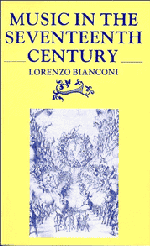Author's preface to the English edition
Published online by Cambridge University Press: 01 June 2011
Summary
As one British reviewer has rightly observed, the present volume ‘unashamedly concentrates on Italian music’. The Seicento, in my opinion, is the final century in the history of European music for which an Italian-oriented approach may not ipso facto be defined as misplaced. Italy – and Italy alone – undeniably provides the back-cloth for a number of the principal innovations, events and personalities of the period: the ‘invention’ of opera and the institution of the first public theatres, the beginnings and development of a modern concept of ‘concerto’, the very name of Monteverdi (himself the most celebrated of a series of major figures who span the century as a whole). In musical terms, seventeenth-century Italy is undoubtedly a centre – or, rather, a whole series of centres – of European significance. This is amply demonstrated by the interest and enthusiasm of northern Europeans – simple tourists or composers of renown (the prime example is Schütz) – for all kinds of musical innovation of Italian derivation, as also by the rate of flow of Italian musicians and musical manuscripts towards the courts and major cities of northern Europe. Seventeenth-century Italy, however, can no longer be described – contrary to the situation in the previous century – as the musical centre of Europe, but rather as one of several centres. Earlier migratory trends are reversed.
- Type
- Chapter
- Information
- Music in the Seventeenth Century , pp. vii - xPublisher: Cambridge University PressPrint publication year: 1987

